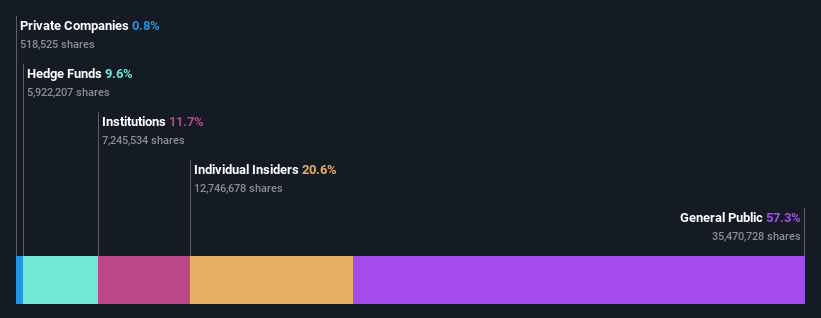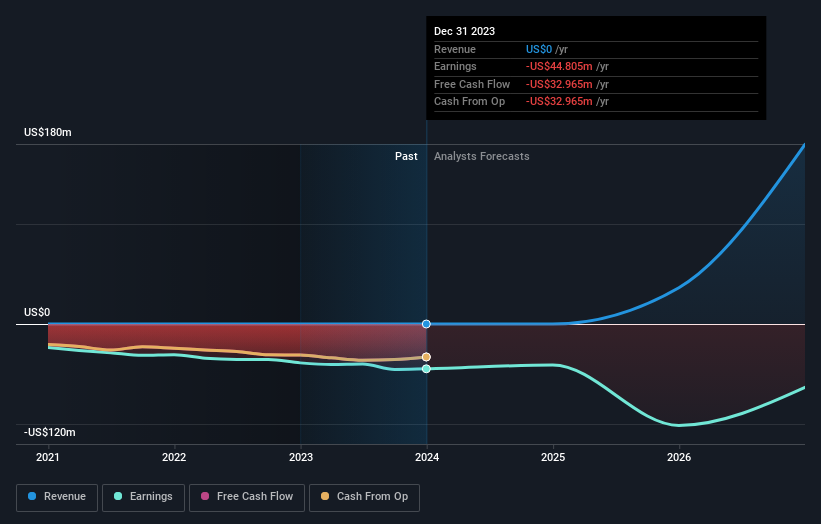Stock Analysis
- United States
- /
- Biotech
- /
- NasdaqCM:GALT
Galectin Therapeutics Inc.'s (NASDAQ:GALT) 13% gain last week benefited both individual investors who own 57% as well as insiders

Key Insights
- Galectin Therapeutics' significant individual investors ownership suggests that the key decisions are influenced by shareholders from the larger public
- A total of 25 investors have a majority stake in the company with 41% ownership
- Recent purchases by insiders
To get a sense of who is truly in control of Galectin Therapeutics Inc. (NASDAQ:GALT), it is important to understand the ownership structure of the business. With 57% stake, individual investors possess the maximum shares in the company. Put another way, the group faces the maximum upside potential (or downside risk).
Individual investors gained the most after market cap touched US$214m last week, while insiders who own 21% also benefitted.
In the chart below, we zoom in on the different ownership groups of Galectin Therapeutics.
Check out our latest analysis for Galectin Therapeutics

What Does The Institutional Ownership Tell Us About Galectin Therapeutics?
Institutions typically measure themselves against a benchmark when reporting to their own investors, so they often become more enthusiastic about a stock once it's included in a major index. We would expect most companies to have some institutions on the register, especially if they are growing.
We can see that Galectin Therapeutics does have institutional investors; and they hold a good portion of the company's stock. This can indicate that the company has a certain degree of credibility in the investment community. However, it is best to be wary of relying on the supposed validation that comes with institutional investors. They too, get it wrong sometimes. If multiple institutions change their view on a stock at the same time, you could see the share price drop fast. It's therefore worth looking at Galectin Therapeutics' earnings history below. Of course, the future is what really matters.

It would appear that 9.6% of Galectin Therapeutics shares are controlled by hedge funds. That worth noting, since hedge funds are often quite active investors, who may try to influence management. Many want to see value creation (and a higher share price) in the short term or medium term. Looking at our data, we can see that the largest shareholder is Richard Uihlein with 17% of shares outstanding. For context, the second largest shareholder holds about 9.6% of the shares outstanding, followed by an ownership of 3.1% by the third-largest shareholder. Additionally, the company's CEO Joel Lewis directly holds 1.5% of the total shares outstanding.
Our studies suggest that the top 25 shareholders collectively control less than half of the company's shares, meaning that the company's shares are widely disseminated and there is no dominant shareholder.
While studying institutional ownership for a company can add value to your research, it is also a good practice to research analyst recommendations to get a deeper understand of a stock's expected performance. While there is some analyst coverage, the company is probably not widely covered. So it could gain more attention, down the track.
Insider Ownership Of Galectin Therapeutics
The definition of company insiders can be subjective and does vary between jurisdictions. Our data reflects individual insiders, capturing board members at the very least. Company management run the business, but the CEO will answer to the board, even if he or she is a member of it.
I generally consider insider ownership to be a good thing. However, on some occasions it makes it more difficult for other shareholders to hold the board accountable for decisions.
Our information suggests that insiders maintain a significant holding in Galectin Therapeutics Inc.. Insiders own US$44m worth of shares in the US$214m company. It is great to see insiders so invested in the business. It might be worth checking if those insiders have been buying recently.
General Public Ownership
The general public, who are usually individual investors, hold a substantial 57% stake in Galectin Therapeutics, suggesting it is a fairly popular stock. With this amount of ownership, retail investors can collectively play a role in decisions that affect shareholder returns, such as dividend policies and the appointment of directors. They can also exercise the power to vote on acquisitions or mergers that may not improve profitability.
Next Steps:
I find it very interesting to look at who exactly owns a company. But to truly gain insight, we need to consider other information, too. Be aware that Galectin Therapeutics is showing 6 warning signs in our investment analysis , and 3 of those are a bit unpleasant...
But ultimately it is the future, not the past, that will determine how well the owners of this business will do. Therefore we think it advisable to take a look at this free report showing whether analysts are predicting a brighter future.
NB: Figures in this article are calculated using data from the last twelve months, which refer to the 12-month period ending on the last date of the month the financial statement is dated. This may not be consistent with full year annual report figures.
Valuation is complex, but we're helping make it simple.
Find out whether Galectin Therapeutics is potentially over or undervalued by checking out our comprehensive analysis, which includes fair value estimates, risks and warnings, dividends, insider transactions and financial health.
View the Free AnalysisHave feedback on this article? Concerned about the content? Get in touch with us directly. Alternatively, email editorial-team (at) simplywallst.com.
This article by Simply Wall St is general in nature. We provide commentary based on historical data and analyst forecasts only using an unbiased methodology and our articles are not intended to be financial advice. It does not constitute a recommendation to buy or sell any stock, and does not take account of your objectives, or your financial situation. We aim to bring you long-term focused analysis driven by fundamental data. Note that our analysis may not factor in the latest price-sensitive company announcements or qualitative material. Simply Wall St has no position in any stocks mentioned.
About NasdaqCM:GALT
Galectin Therapeutics
A clinical stage biopharmaceutical company, engages in the research and development of therapies for fibrotic, cancer, and other diseases.
Weak fundamentals or lack of information.

